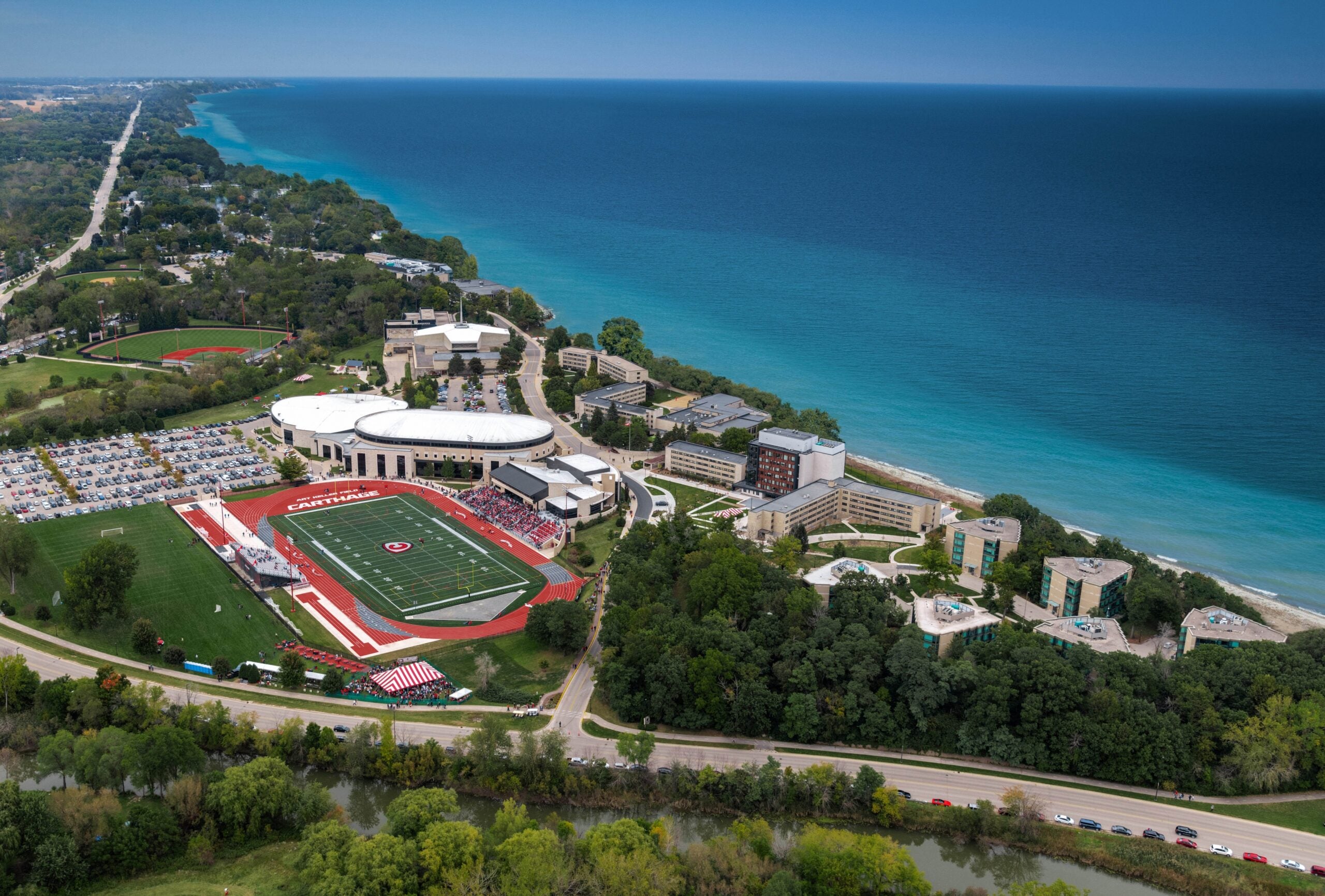Carthage College’s faculty members believe a new policy increasing the number of classes they must teach without upping their pay is the administration’s first step toward laying off staff.
The change to course loads is coming at the same time administrators are increasing minimum enrollment requirements for classes, said Jerald Mast, a political science professor at Carthage.
The college is a small, private liberal arts campus on the shore of Lake Michigan in Kenosha County with a total enrollment of about 2,600 students.
News with a little more humanity
WPR’s “Wisconsin Today” newsletter keeps you connected to the state you love without feeling overwhelmed. No paywall. No agenda. No corporate filter.
“There’s no excess demand for more classes at this point, so the only reason this makes sense is that they will be trying to shrink the faculty,” Mast said.
Last week, 85 percent of Carthage’s 140 full-time faculty members voted to censure the college president John Swallow and provost David Timmerman.
The vote came after staff learned in August their teaching loads would increase next fall to seven courses per academic year for tenure-track faculty members. Contract faculty will have to teach eight classes next fall.
Tenure-track and tenured faculty are currently expected to teach three courses each fall and spring. In addition, faculty teach one month-long course in two of every three winters during what is known as January Term, or J-Term, at the college — that requirement will shift to teaching a J-Term course each year.
Minimum enrollment requirements will be raised from nine to 12 students. Mast says many classes, especially in the smaller departments at the Kenosha liberal arts college, have about 10 students.
“The new teaching and enrollment requirements next fall will have significant effects on educational programing,” Mast said. “It’s unclear where there is a need for additional courses.”
Eric Fulcomer, president of the Wisconsin Association of Independent Colleges and Universities, said there is not a specific number of courses per semester that is considered ideal.
“It is most common for each course to be three credits on a semester system, and for a teaching load at schools with an emphasis on teaching, as opposed to research, to be four courses per term,” Fulcomer said. “But each of our institutions has a unique mission and history and allocate their faculty work loads to meet the needs of the institution.”
Fulcomer said he’s not aware of any other private Wisconsin colleges changing their course load balances at this time.
Carthage College has record enrollment this year
The changes were announced while Carthage is experiencing record enrollment. In August, the school reported the freshman class totaled 892 students, surpassing the previous high of 833 in 2021.
In a statement, Carthage College said it is working to address the challenges facing higher education from a “position of strength.”
“Carthage must continue to prepare for the future,” the statement said. “This is a measured, incremental step needed to ensure Carthage can continue to provide an exceptional education to our students at an affordable cost and offset the anticipated decline in the number of college-aged students.”
Colleges and universities across Wisconsin have struggled in recent years. In May, Cardinal Stritch University closed after 85 years following years of enrollment decline. This month the University of Wisconsin-Oshkosh and UW-Platteville eliminated 200 and 111 positions, respectively, to meet budget deficits. Nationally, at least 91 colleges have closed or consolidated since 2016, with private colleges particularly vulnerable.
Mast said faculty don’t dispute there will be fewer high school students attending college in the future. But they believe the changes the administration is making are premature.
The faculty vote to censure is a formal expression of disapproval of what administrators are doing. It carries less weight than a vote of no confidence in leadership.
Mast said the decision was made to vote to censure in the hopes it would push administrators and the board of trustees to acknowledge the legitimacy of faculty concerns and invite them to the table to negotiate.
That has not happened. On Oct. 20, the Carthage College Board of Trustees voted to affirm the new teaching load policy.
“We can’t overlook what’s happening to regional institutions, including depleting endowments, laying off employees, and, in worst case scenarios, contemplating mergers or closures,” Board Chair Jeff Hamar wrote to faculty. “While the new teaching load policy may feel to many of you to be burdensome and complicated to implement, the Board agrees with the administration that this policy is necessary to further position Carthage to build on its strengths.”
At the same time, the school’s student government passed a resolution last week in support of the faculty. Student Government President Phillip Hunter said the group talked to administrators and faculty about the issue before making their decision.
“I just hope everyone who is involved with this can just come to a resolution that can fit the needs of what Carthage is and where we are going and how we are advancing in the future,” Hunter said.
Carthage faculty joining a national union
Mast said these new requirements come at the same time pay and benefits have been cut. In 2020, Carthage suspended contributions to staffs’ retirement savings plans. The following year, contributions were restored at 50 percent.
At the same time, President Swallow is paid more than all the UW chancellors with the exception of UW-Madison Chancellor Jennifer Mnookin.
Carthage’s 990 report from the fiscal year ending June 2022, the latest available, shows Swallow’s total compensation that year was $607,517. His base salary was $483,858.
By comparison, Mnookin’s base salary this year is $765,000. UW-Milwaukee Chancellor Mark Mone’s base salary is $461,132. The rest of the chancellors in the university system have salaries in the $200,000 range.
Faculty recently submitted paperwork to join the American Association of University Professors, or AAUP, the union representing college professors. Federal law prohibits professors from striking.
Marquette University, Saint Norbert College, UW-Madison, UW-Milwaukee and UW-Whitewater are all members.
Carthage faculty considered joining AAUP in 2020 after administrators cut two departments and 23 positions, including 15 tenured professors.
“Faculty in the wake of that have felt very disrespected and undervalued and not particularly like we’re full partners in the college’s mission,” Mast said.
Changes to course loads pushed faculty to submit their paperwork to AAUP. The Carthage chapter should be up and running in a few weeks.
Wisconsin Public Radio, © Copyright 2025, Board of Regents of the University of Wisconsin System and Wisconsin Educational Communications Board.







